The Hidden Cost of Tariffs
And Why Consumers End Up with the Empty Glass
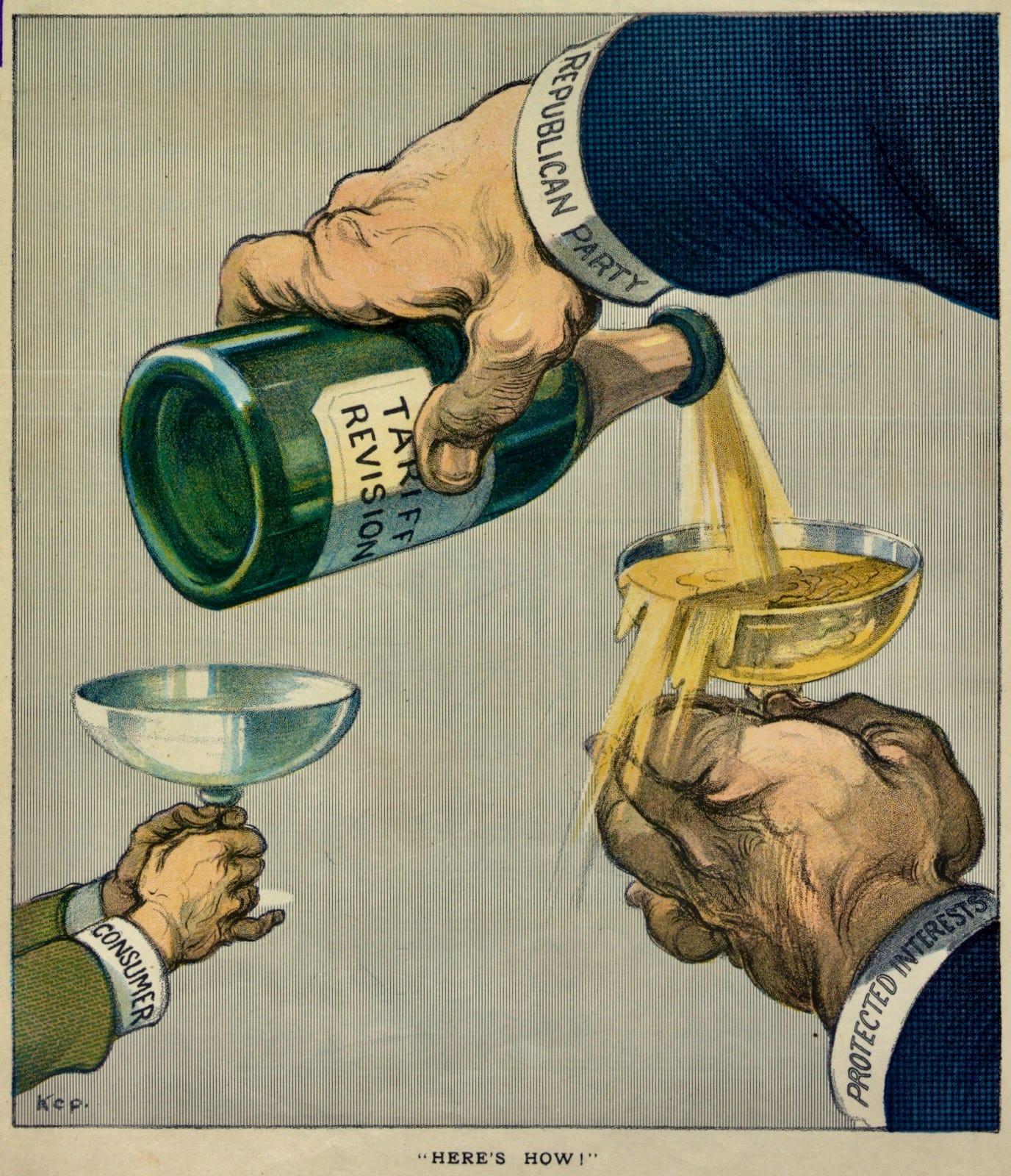
In 1908, a Puck cartoonist captured the bitter irony of American tariffs with a simple scene: a hand labeled “Republican Party” pours champagne from a bottle marked “Tariff Revision” into a glass held by a portly hand labeled “Protected Interests.”
Meanwhile a smaller pair of hands labeled “Consumer” hold an empty glass, reaching for the promised prosperity that never comes.
The image is a perfect symbol of how tariffs, sold as “protection for the people,” often serve as hidden taxes on those same people, enriching an elite few and leaving consumers with inflated prices and empty promises.
Click all images to enlarge
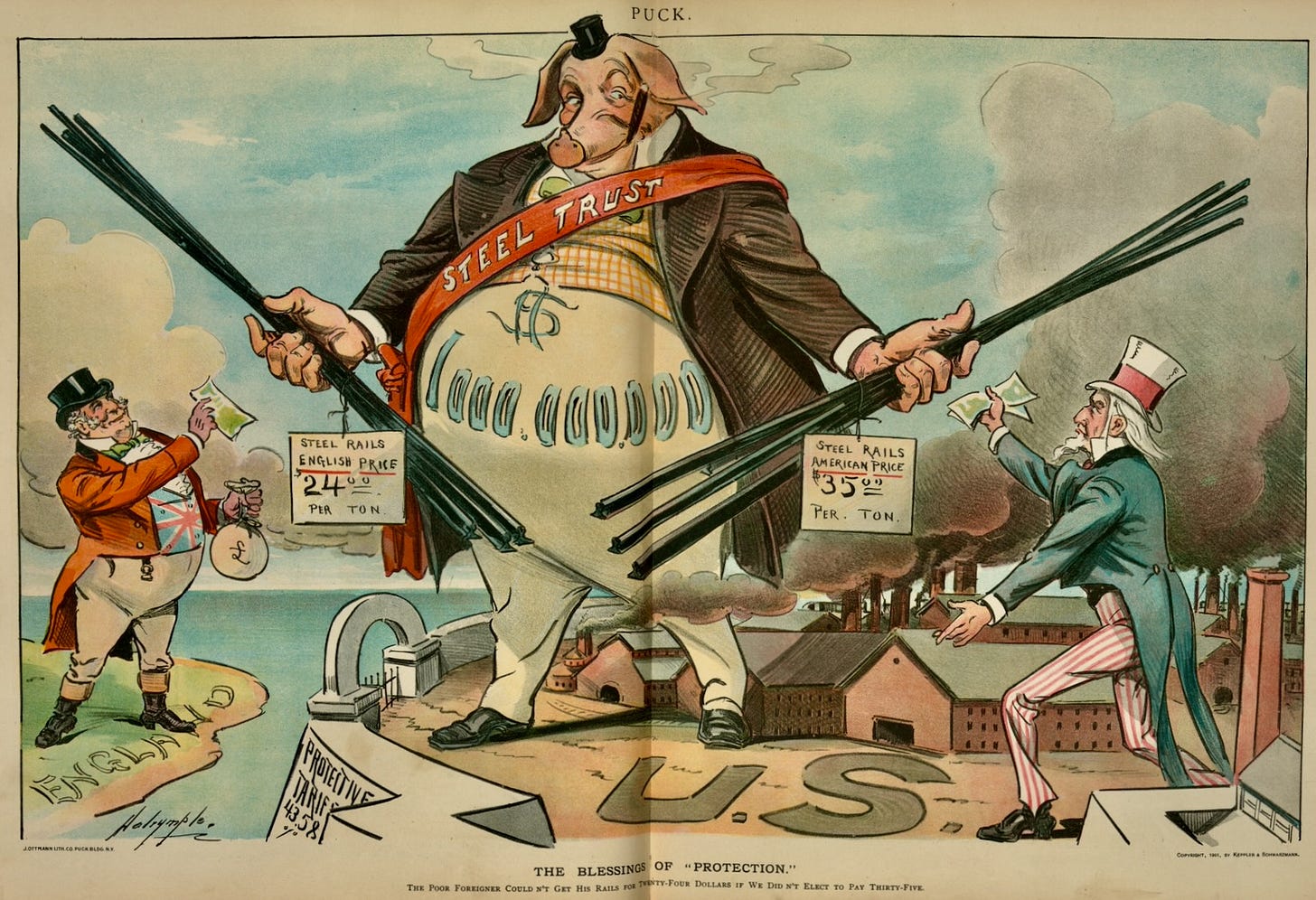
Another ‘Gilded Age’ cartoon reinforces the point. Here, a bloated characture with a pig’s head labeled “Steel Trust” stands smugly behind a tariff wall on American soil, gripping steel rails in each hand.
Across the ocean, John Bull (England) buys steel rails at a low “English Price.” But Uncle Sam, forced to buy American thanks to a “Protective Tariff,” pays a far higher price.
This cartoon lays bare the reality of Gilded Age tariffs: monopolies grew fat on inflated prices, shielded from competition, while U.S. consumers bore the cost.
Fast-forward to 2024, and Donald Trump has rekindled this historical dynamic with a proposal for massive tariffs: 20% on all foreign goods, 60% on Chinese imports, and up to 200% on certain cars.
Trump claims these tariffs will make America wealthy, protect jobs, and send foreign competitors reeling, insisting “China will pay.”
But history suggests otherwise. Just like in the Gilded Age, Trump’s high tariffs are more likely to leave American consumers holding that empty glass.
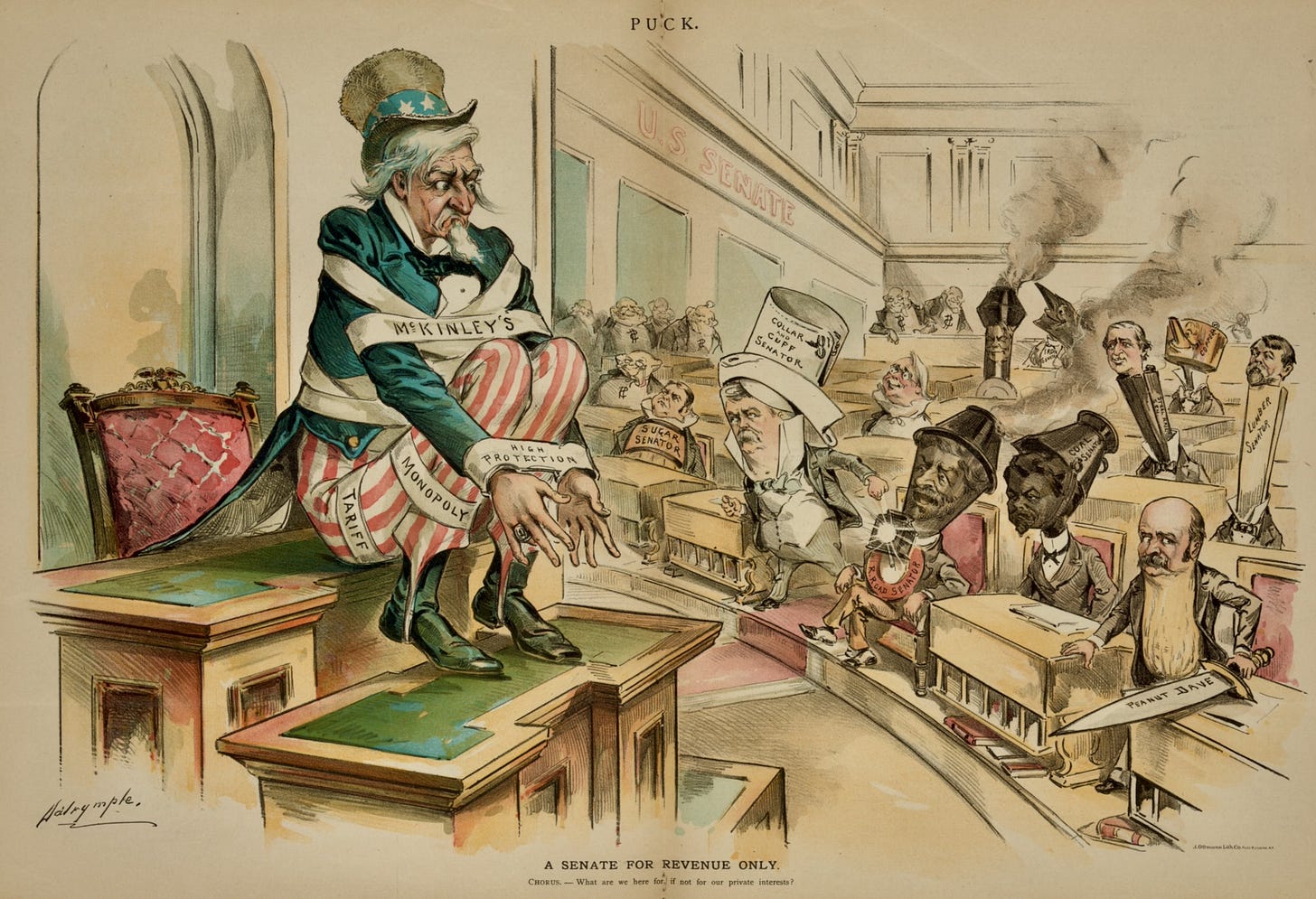
The Tariff King and Trump’s “Golden Age” Fantasy
Trump’s inspiration for his tariff agenda is clear: President William McKinley - his “Tariff King.” Trump praises McKinley’s high tariffs as the backbone of 1890s prosperity, calling it “perhaps the most affluent period” in American history.
But that “golden age” was prosperous only for a few. While high tariffs under McKinley did create wealth, that wealth stayed concentrated among powerful trusts and industrialists who ran the U.S. Senate.
For most Americans, it meant rising prices and stagnant wages.
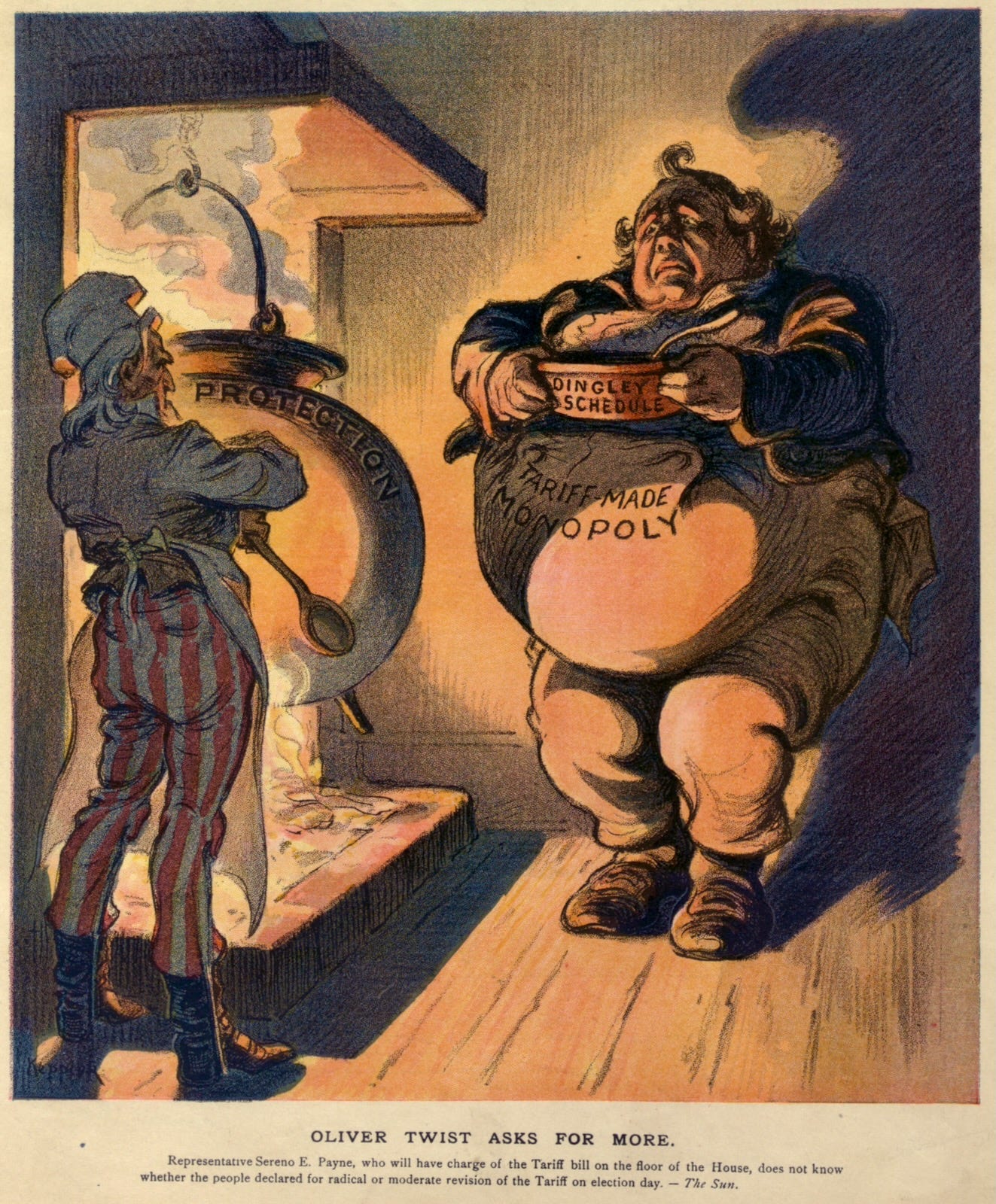
This 1908 cartoon captures this truth vividly. A bloated “Tariff-Made Monopoly” holds out a bowl to Uncle Sam and asks for another serving of “Protection,” the profit-heavy stew served to steel, coal, and railroad tycoons. These monopolies thrived under high tariffs, while American consumers paid inflated prices.
Trump’s 2024 tariffs could set the stage for a similar outcome, letting monopolies raise prices with little competition. Trump’s “China will pay” mantra misses a key point: the burden will fall on American wallets.
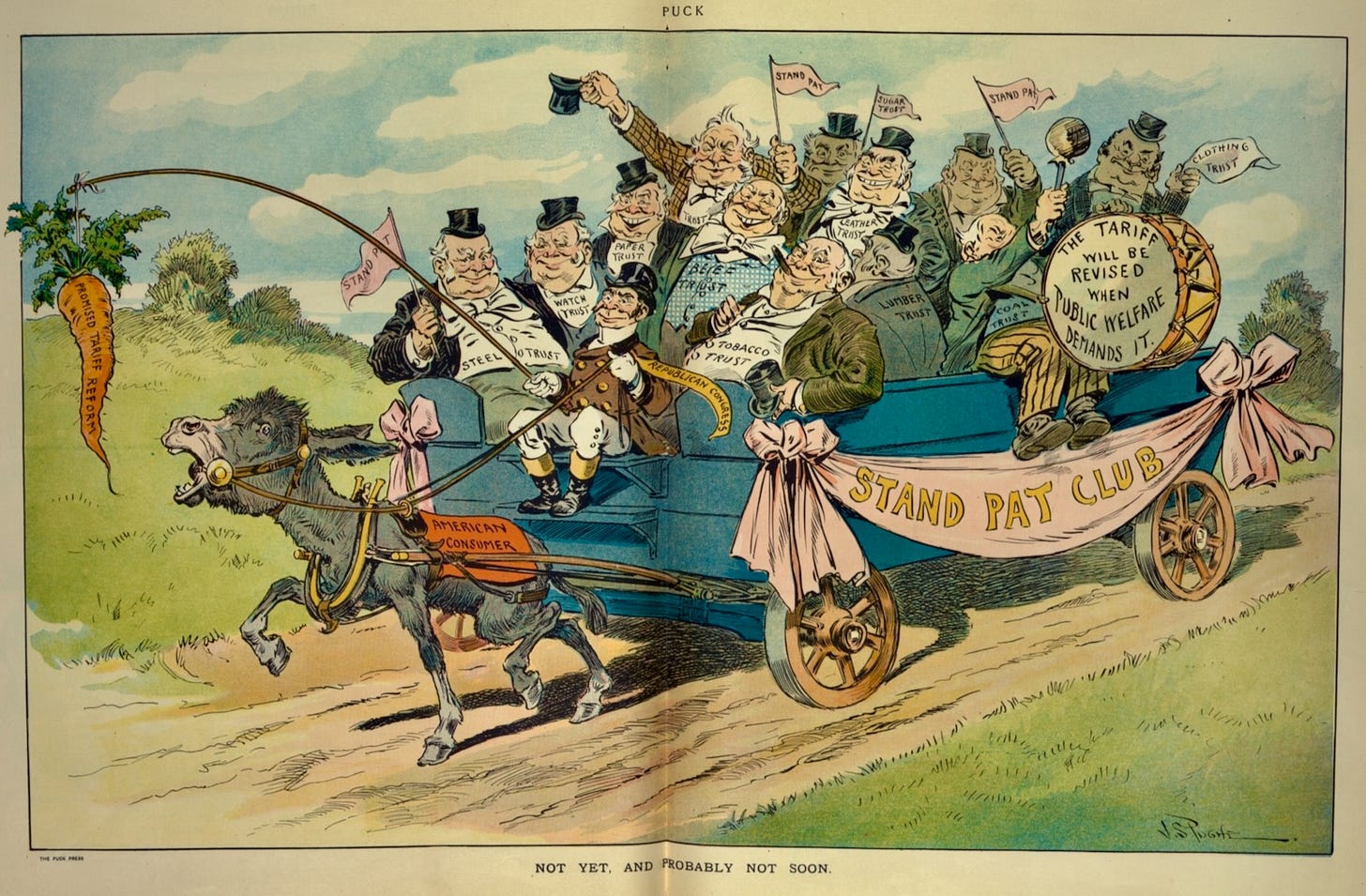
The Consumer’s Load: Higher Tariffs, Higher Prices
High tariffs might seem abstract, but their impact is immediate. When tariffs rise, importers pass those costs on to consumers. Without foreign competition, domestic producers are free to hike prices too.
A 1908 cartoon, showing the “American Consumer” as a donkey chasing the elusive “Promised Tariff Reform,” captures this endless struggle. The donkey strains under the weight of monopolies while hoping for relief that never comes.
Under Trump’s 2024 proposals, these hidden taxes would quickly add up, hitting Americans where they live. As history shows, the “empty glass” of consumer benefit is never far behind.
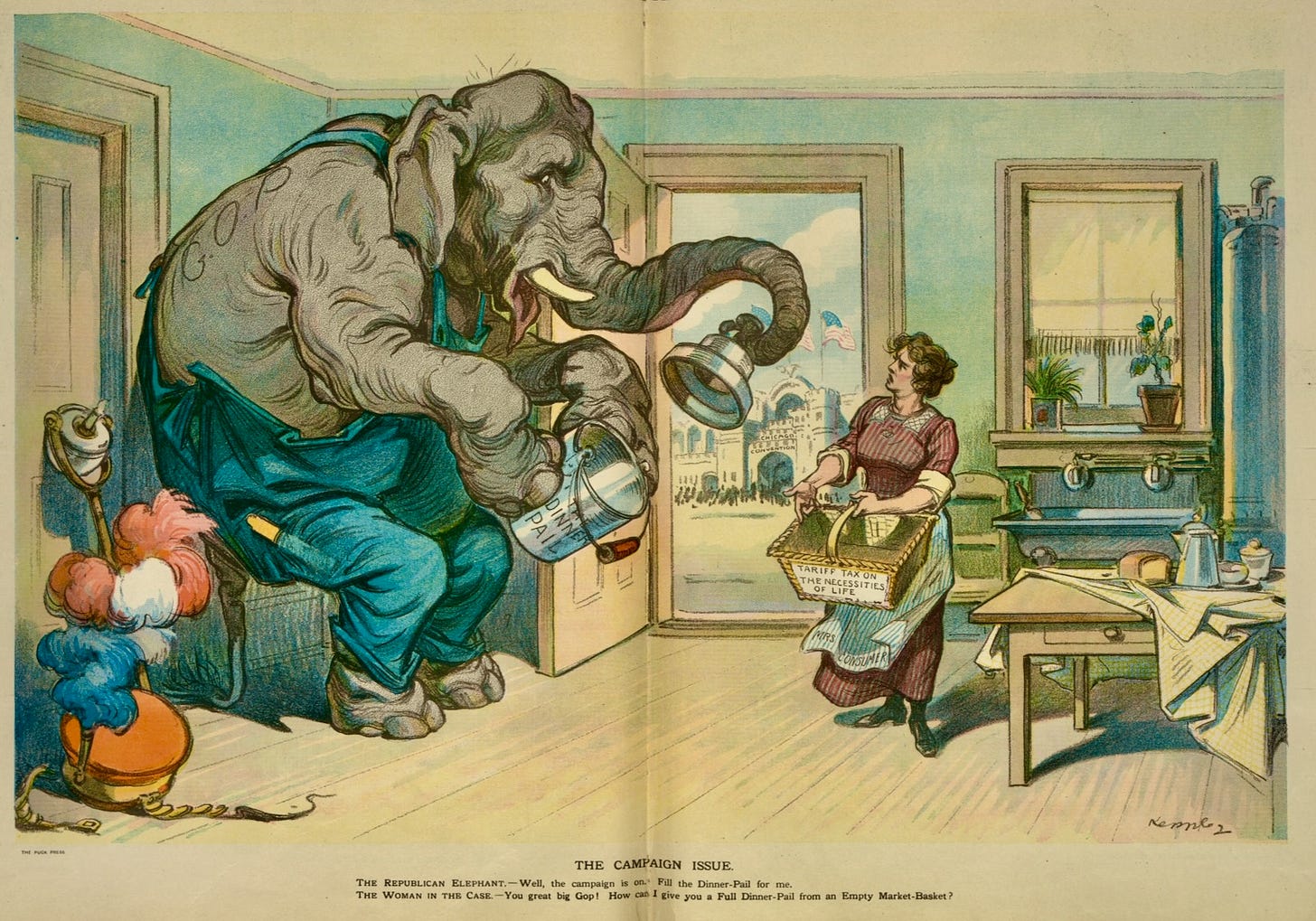
In another Gilded Age cartoon, “Mrs. Consumer” stands with an empty market basket while the Republican elephant begs for more. This cartoon highlighted how tariffs drove up prices on essentials, squeezing household budgets.
Trump’s proposed tariffs would likely have a similar effect, raising the cost of basics for millions of Americans.
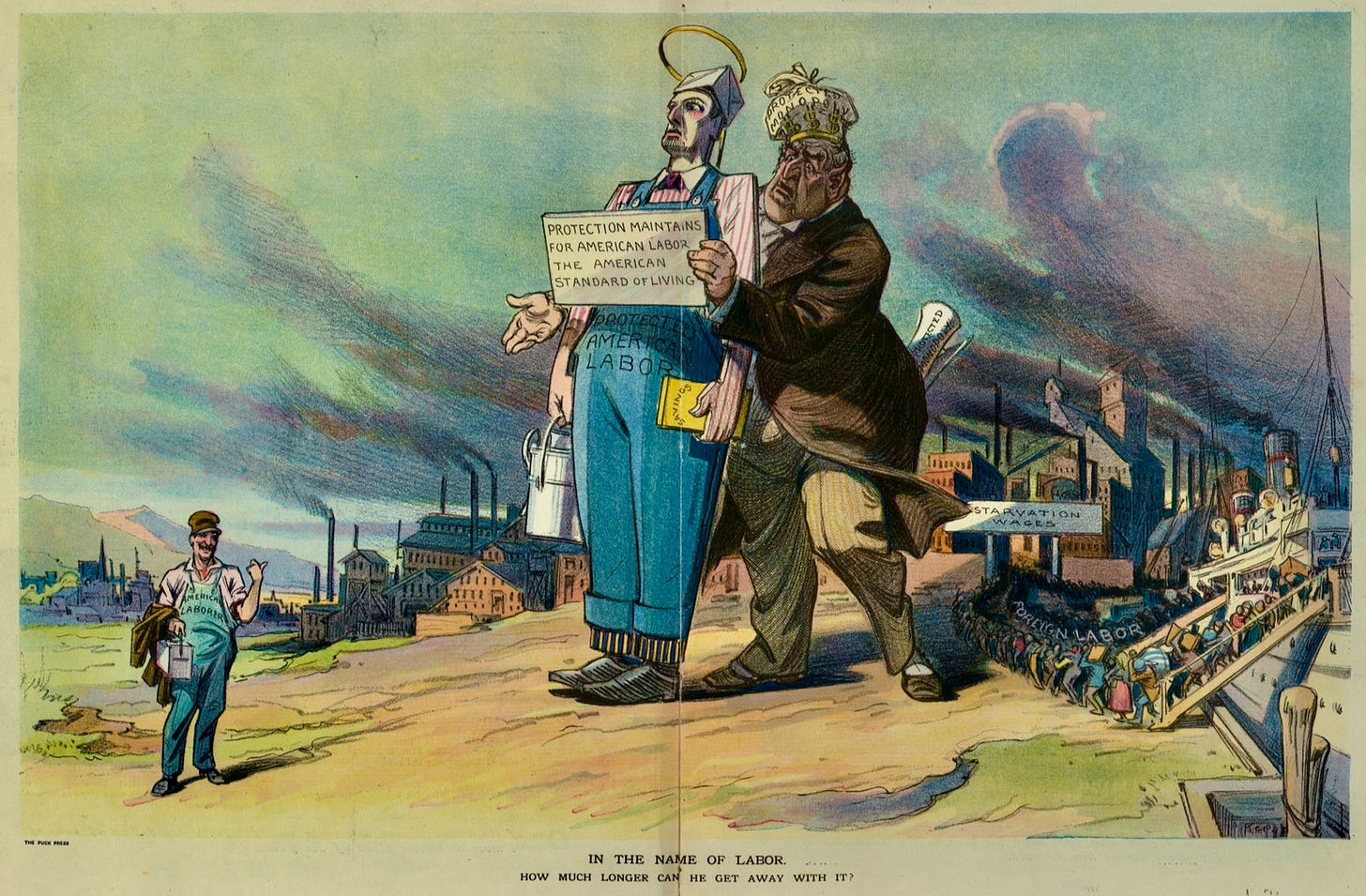
The Myth of the Protected Worker
Trump’s tariffs are billed as shields for American jobs, but history shows that tariffs rarely offer much protection to workers.
A 1912 Gilded Age cartoon captures this reality: a giant “Protected Monopoly” holds up a fake wooden cutout labeled “Protected American Labor,” while the real worker stands on the sidelines watching cheap immigrant labor pour into the country.
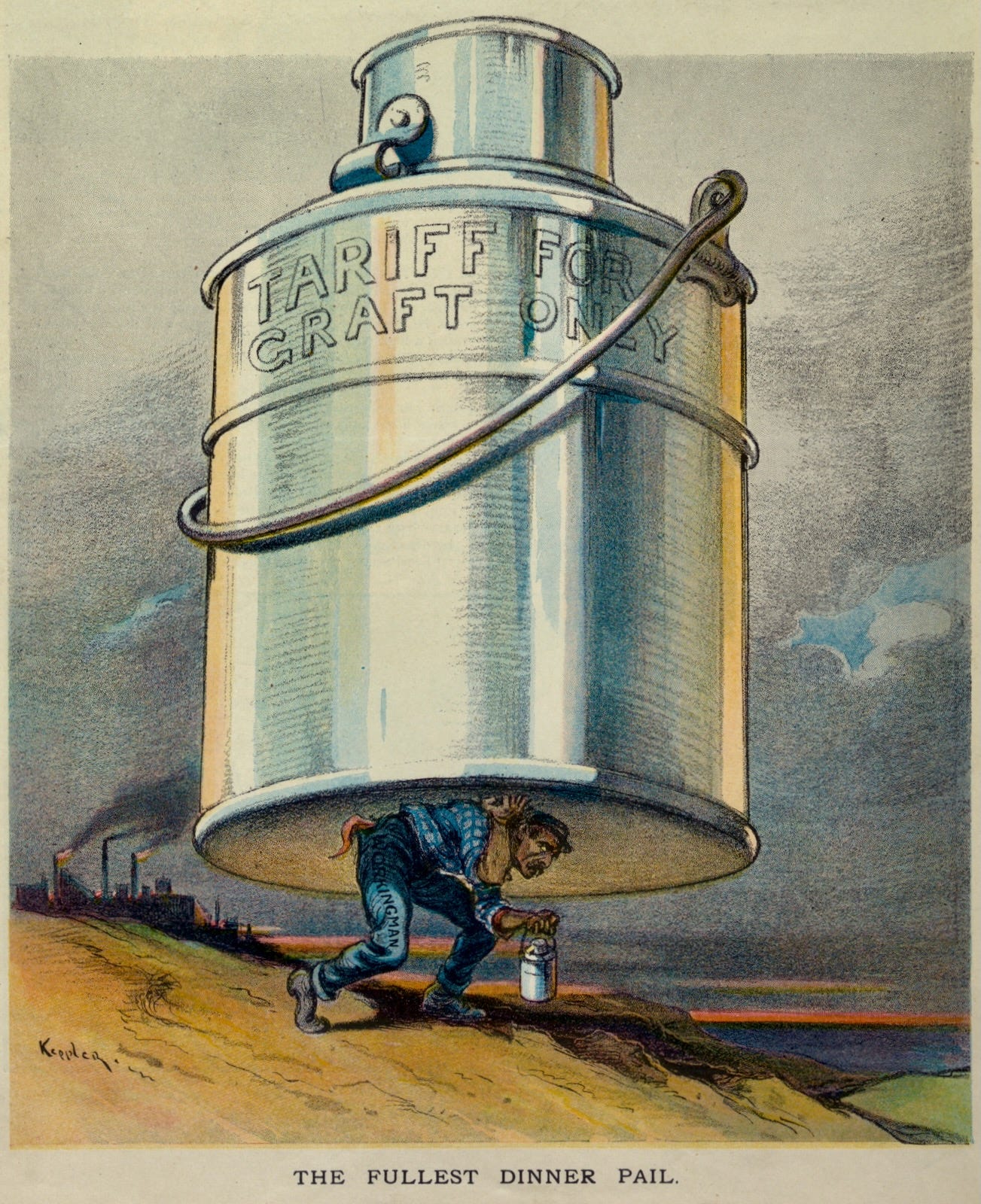
Tariffs increase costs but don’t spur wage growth, leaving workers with higher prices and little to show for it. The tariff system was susceptible to corruption and political favoritism, with industries lobbying for favorable rates.
Under Trump’s previous tariffs, consumer prices rose while promised job gains didn’t materialize. Trump imposed a 50% tariff on imports of washing machines in 2018. Researchers estimate the value of washing machines jumped and cost US consumers an extra $1.5 Billion a year.
His new tariffs risk repeating the same cycle: corporations profit while workers bear the cost.
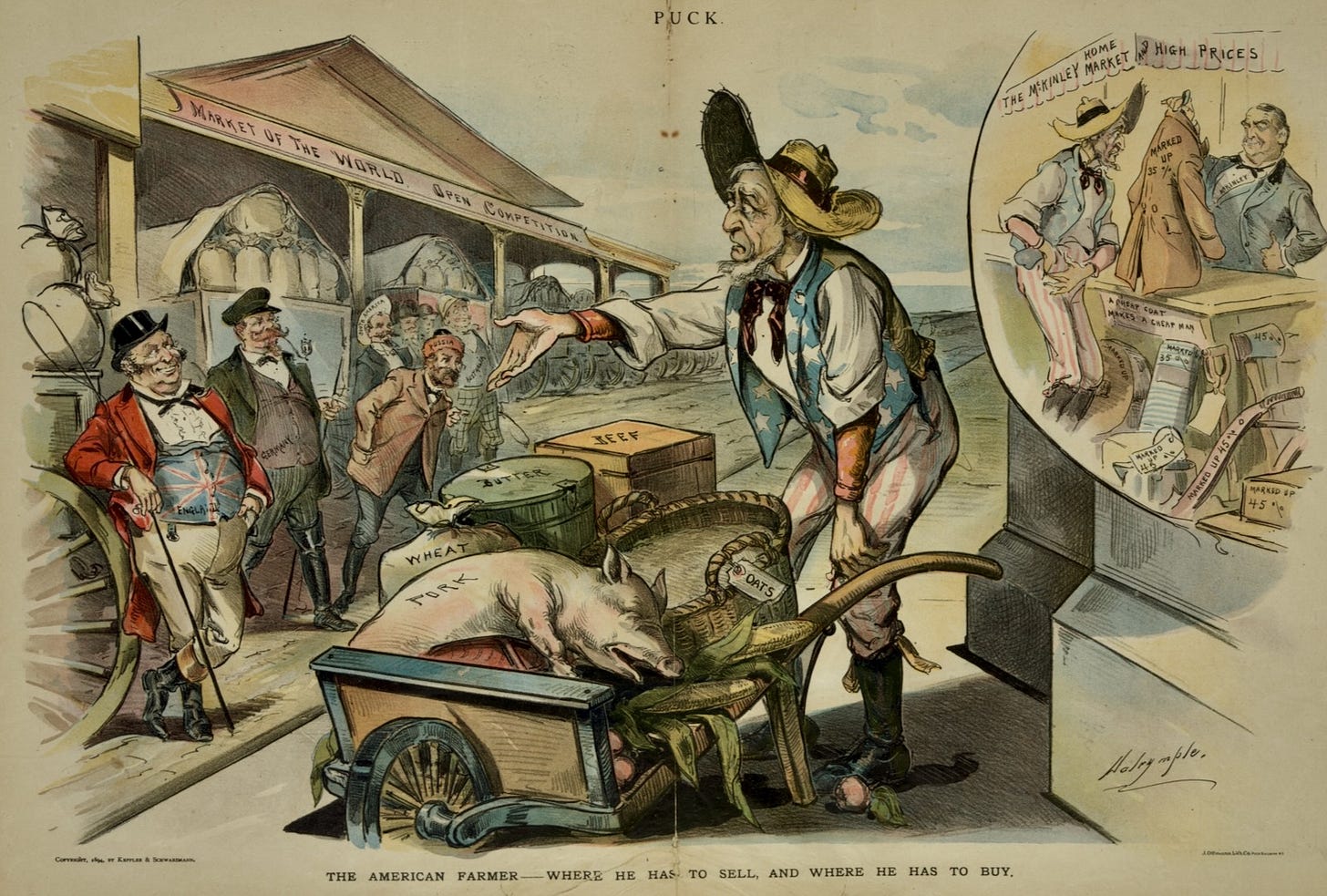
Isolating American Businesses in the World Market
Tariffs carry another risk: isolation. When the U.S. imposes tariffs, other countries often retaliate, limiting American access to foreign markets. A 1894 cartoon shows Uncle Sam alone at the “World Market,” unable to compete as other nations turn elsewhere.
Trump’s tariffs could provoke a similar backlash, closing off markets for U.S. farmers, manufacturers, and tech companies. As in the 1890s, protectionism risks leaving American businesses isolated, with shrinking exports cutting into revenues.

The Uphill Battle of Tariff Reform: Cycles of Economic Strain
An 1894 cartoon shows a St. Bernard labeled “Tariff Reform” trudging through snow, struggling to rescue a worker buried under the “McKinley Tariff.” It’s a vivid image of how entrenched interests can make tariff reform an uphill battle.
Trump’s new tariffs—up to 200%—could cement a protectionist cycle that benefits big industry but burdens consumers. Like in McKinley’s era, once these barriers go up, dismantling them becomes an exceptionally difficult task.
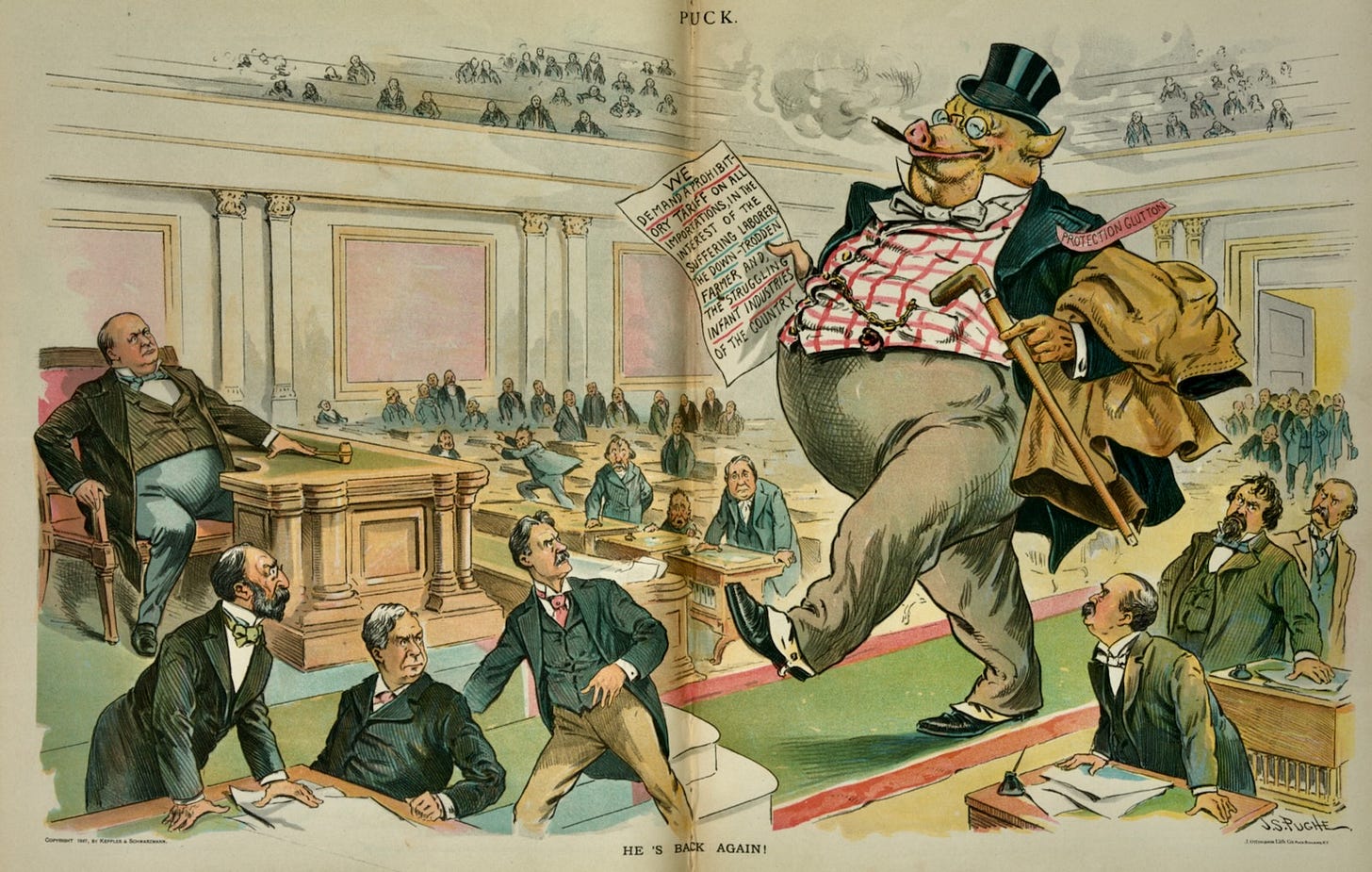
Conclusion: The Persistent Feast of the “Protection Glutton”
An 1890 cartoonist captured it all with brutal clarity: a “Protection Pig” strides into Congress, demanding “a prohibitory tariff on all imports, in the interest of the suffering laborer and the struggling industries.” The pig’s demand exposes a historic truth: tariffs, sold as economic salvation, tend to benefit the few while raising costs for the many.
Trump’s proposed tariffs follow the same old pattern. By dusting off McKinley’s high-tariff playbook, his plan promises prosperity but delivers it to large corporations, who can raise prices while consumers are left holding the empty glass.
The lesson is clear: under tariffs, someone always drinks first—and it’s never the consumer.
More from that era?
Cocaine, Opium, and the Color Line
"The Age of Drugs" by Dalrymple (1900), offers a glimpse into America's relationship with drugs at the turn of the 20th century. The bustling drugstore scene depicts a pharmacist doling out an array of remedies to a desperate crowd - Opium, Cocaine, Strychnine.
The Politics of Panic
The 1893 cartoon “Looking Backward” captures a timeless hypocrisy: well-dressed, established Americans—descendants of earlier immigrants—shun a new arrival, forgetting their own families once faced the same hostility. This powerful image reflects a cycle of rejection that repeats across generations.



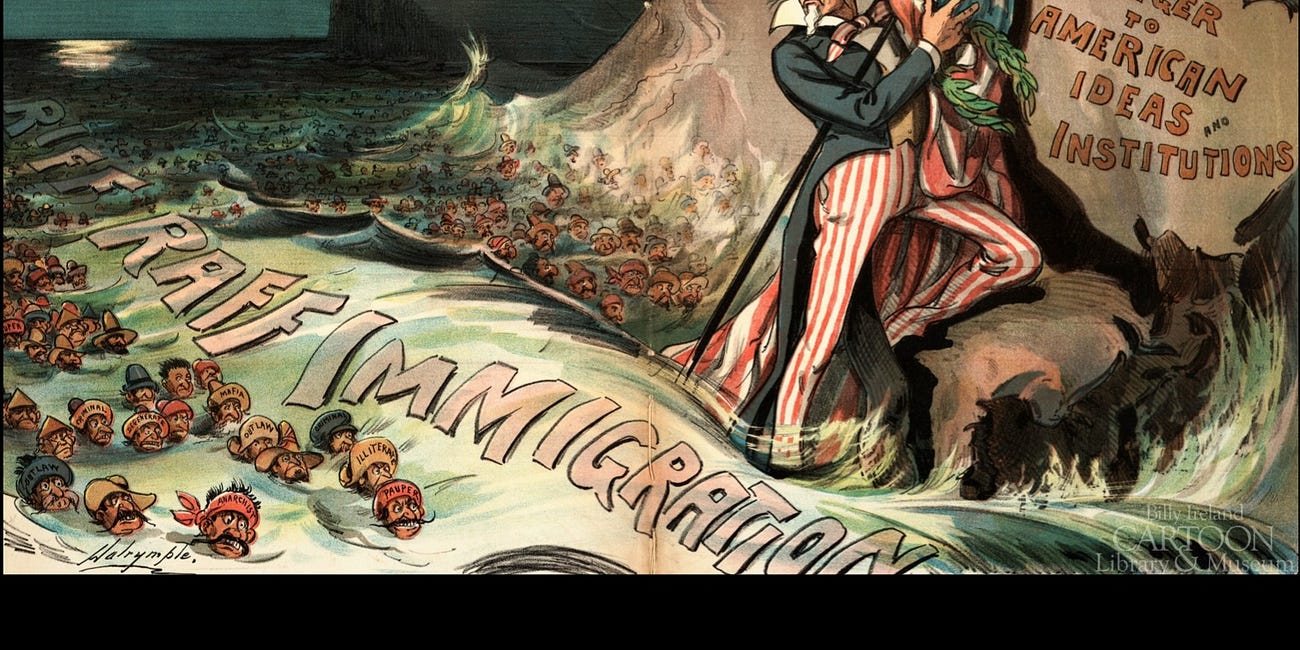
But of COURSE tfg is only interested in the wealthy and what benefits them,and the empty headed yutzes who voted him in are in for several nasty surprises.They don't yet understand what they will lose,alongside everyone else.They won't be exceptions to any of his policies,only his wealthy friends and benefactors will.
The day will come when all those enthusiastic voters will have buyers remorse,and wish they had never heard of him,forget wishing they never listened to his lies.He is infamous for backing out on his word,acting like he"don't remember"saying thus and so,and stabbing people in the back as easily as breathing.Had these same people bothered to remember his antics in the 70s,80s and 90s,how he cheated contractors out of the money he promised them,and when taken to court,he put off the hearings for months,finally either bankrupting these contractors until they had nothing left,or else going bankrupt himself,to avoid the debts,and paying these people literally pennies on the dollar of what he owed them.There have been reports of some people commiting suicide because of him.He is ruthless and heartless,as his supporters will soon find out.He is loyal to no one but himself.
I plan on supporting the ACLU and the NAACP, because they will fight back on tfg and his minions trying to run roughshod over our rights.We need people like them,to keep these people in check.We will need our rights as much intact as possible, because eventually we will need those to rebuild when these people are gone(and yes,someday they will be.)
Find people and organizations to support,even volunteer for if you can,that will help us fight back.And let the rest of us know who we can help support as well.We all need all the help we can get.
Don't give up.Fight back!
This post exemplifies the kind of informed history and economics teaching that more Americans need to have!